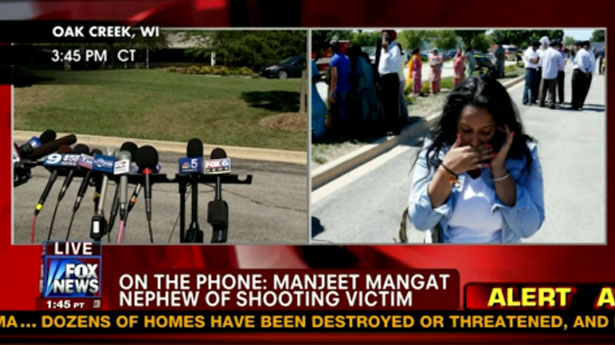VIDEO: Fox Host Asks About Anti-Semitism At Sikh Temple
Following the shooting at a Sikh temple in Wisconsin on Sunday, Fox News host Gregg Jarrett asked a nephew of one of the victims, “Have there been any prior acts of violence against members of the temple? Any anti-Semitic acts?”
Was this a side-effect of Fox News’ habitual concern for the feelings of its right-wing pro-Israel following?
Or did Jarrett simply mistake Sikhs for Semites?
If the latter, this would not be the first time Sikhs were mistaken for “Abrahamic” peoples. Four days after the the horrific events of 9/11, a Sikh gas station owner named Balbir Singh Sodhi was shot five times and killed by a man seeking revenge for the terrorist attacks, in which no Sikhs or Indians had a hand in perpetrating.
Though Monotheistic, Sikhism does not originate in any of the regions from which “Semitic” peoples traditionally trace their lineages, which include the Levant, the Arabian Peninsula, and the Horn of Africa. Founded in 15th-century India, Sikhism arose as a rejection of its homeland’s strict caste system, and Sikhs continue to place a large emphasis on equality.
Baptized Sikhs wear turbans, stop cutting their beards and hair and carry a ceremonial dagger. Many Muslim men, of course, also wear turbans and allow their beards to grow out. The resulting confusion has turned both communities into targets for violence, derision, and discrimination. In July 2004, two Sikh men were beaten in New York by men who mocked them for wearing turbans. In December 2001, two men beat a Sikh shopowner in Los Angeles with metal poles, saying, “We’ll kill bin Laden today.” In 2010, a Sikh cab driver in West Sacramento suffered spinal fractures after a passenger attacked him and called him a Muslim.
Until recently, even the FBI compiled data on anti-Muslim and anti-Sikh attacks together. Earlier this year, Rep. Joe Crowley (D-N.Y.) sent a letter to the FBI asking them to start tracking attacks on Sikhs separately, which ninety fellow members of Congress signed.
As the years since 9/11 have gone by and as the work of groups such as the Sikh Coalition have gained traction in this country, the hatred and ignorance that fueled attacks on Sikhs seemed to have dissipated. (To be sure, subtler forms of discrimination still linger. For example, employers often discourage Sikhs from applying for jobs where they have to interact with customers, pushing them toward backroom jobs instead.) But the recent shooting in Wisconsin and Jarrett’s cultural confusion remind us that we still have much to learn about the various communities that participate in the American Dream alongside our own.
Jarrett’s mistake and the racial violence that has taken the lives of too many innocent Americans — Sikhs, Muslims, and others — are symptoms of similar maladies. Obviously, cultural education is not the only measure that is needed to prevent senseless murder; but it is one of the steps we need to take in order to stamp out the kind of ignorance in this country that leads to apathy, discrimination, and disregard for the reality that American communities have an equal interest in the benefits of diversity and intergroup collaboration.

